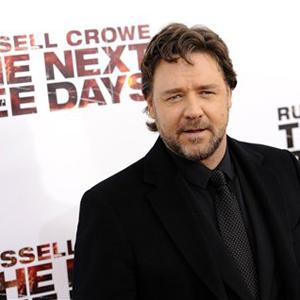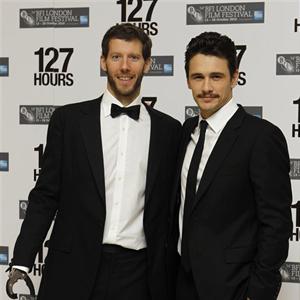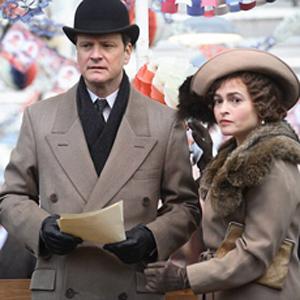SHIRLEY GRIFFITH: Welcome to THIS IS AMERICA in VOA Special English. I'm Shirley Griffith.
STEVE EMBER: And I'm Steve Ember. Some of the best movies of the year are released in December. Many will be competing for Academy Awards next year. This week we look at a few of these interesting new films.
(Sound: "The Black Swan")
"I had the craziest dream last night about a girl who was turned into a swan; but her prince falls for the wrong girl and she kills herself."
SHIRLEY GRIFFITH: One of the most talked about new movies is a psychological thriller about the world of ballet called "Black Swan." Natalie Portman plays a young woman named Nina Sayers who dances in a New York ballet company. She is given the leading role in a production of the famous ballet "Swan Lake." She must dance two roles -- the innocent White Swan and the evil Black Swan. The director of the ballet company, played by French actor Vincent Cassel, questions whether she can do this.
(Sound: "The Black Swan")
"In four years, every time you dance I see you obsessed with getting each and every move perfectly right, but I never see you lose yourself ... ever. All that discipline for what?"
"I want to be perfect."
"Perfection is not just about control. It is also about letting go. Surprise yourself so you can surprise the audience. Transcendence: very few have it in them."
STEVE EMBER: Nina works hard to meet the expectations of the ballet director. She becomes a great dancer but has severe emotional problems. Mila Kunis co-stars as Lily, a dancer who is competing for the leading role in the ballet. Both young actresses trained intensively to be able to dance their roles which were physically demanding.
Many critics are praising Natalie Portman's performance and are predicting an Academy Award nomination for her. The movie also features Barbara Hershey as Nina's overly protective mother who hopes her daughter will have the success she failed to gain. Winona Ryder plays the former lead dancer who was replaced by Nina.
Darren Aronofsky directed "Black Swan." He says the movie shows how hard it is to be a ballet dancer. He also says it represents the beauty of the art. The world of ballet is far different from the world of professional wrestling that Aronofsky showed in his last movie, "The Wrestler."
(MUSIC)
SHIRLEY GRIFFITH: Oscar-winning writer-director Paul Haggis explores what a husband will do for love in his latest film, "The Next Three Days." This crime drama stars Russell Crowe and Elizabeth Banks. The film is an American version of a 2008 French thriller called "Pour Elle." It tells the story of a schoolteacher who creates a plan to break his wife out of prison.

STEVE EMBER: Russell Crowe plays John Brennan, a college professor. He and his young son are shocked when their wife and mother, Lara, is arrested. She is accused of murdering her supervisor. She is tried, found guilty and sentenced to life in prison. John refuses to believe Lara is guilty. He makes every possible appeal but fails to gain her release.
(Sound: "The Next Three Days")
"Forget that Lara is your wife. Look at the evidence."
"I've seen the evidence. She is innocent."
"It doesn't matter what we believe; Lara is not getting out."
SHIRLEY GRIFFITH: After Lara attempts suicide, John gets information from the Internet. He develops a plan to break his wife out of a local jail. He attempts the dangerous plot just three days before she is to be sent to a high-security prison.
STEVE EMBER: Writer-director Paul Haggis says the research John does in the movie is similar to the studying he did for the film.
SHIRLEY GRIFFITH: John never questions Lara's innocence. But filmmaker Paul Haggis wants viewers to make up their own minds.
(Sound: "127 Hours")
STEVE EMBER: The true story of mountain climber Aron Ralston's near-death experience is told in the film "127 Hours." Critics have praised this movie as one of the best of the year. James Franco plays Aron Ralston who became trapped in a canyon during a rock climbing trip in 2003.

The 26-year-old went hiking alone in Canyonlands National Park in the western state of Utah. A huge rock became loose and sent him falling into a deep crack in the canyon. His right arm was crushed between the rock and the canyon wall. Aron Ralston could not move. He knew his chances of survival were low because he had not told anyone where he was hiking.
Aron Ralston spent 127 hours trapped and alone. Finally, after five days, he decided he had to cut off his arm in order to escape. The young climber carried out the amputation using a small, unsharpened knife. Then he dragged himself from his rocky prison and hiked out to safety. Aron Ralston wrote a book about his experience called "Between a Rock and a Hard Place."
SHIRLEY GRIFFITH: Filmmaker Danny Boyle shows the hours that Aron Ralston struggled to survive in extreme conditions. The young climber's suffering increases as he battles extreme heat, lack of water and the threat of death. For two hours the audience stays captive with Ralston. The film includes comments based on some of the messages Aron Ralston recorded on his video recorder to friends and family while he was trapped.
(Sound: "127 Hours")
"This marks 24 hours since I'm stuck and chipping away. I have 150 milliliters of water left which would keep me alive until tomorrow night if I'm lucky. So, that's it."
STEVE EMBER: A film that takes place almost completely in one place is difficult to make. Director Danny Boyle uses intense music against the images of Ralston alone in the wild. He also shows the main character's memories of family members and loved ones. This brings moviegoers into Ralston's mind and shows how the relationships help him to stay alive. But Boyle says the movie is about more than survival.
DANNY BOYLE: "It's about someone who's turned his back on his friends and family and society and goes through this extraordinary change. He's forced by the events to re-examine his life and where he went wrong and what he could've done differently, people he could've treated in a slightly kinder way, maybe."
SHIRLEY GRIFFITH: The audience watches as Aron Ralston cuts off his arm to free himself.
DANNY BOYLE: "In reality it took him over 40 minutes, and involved a series of plateaus of pain that he had to live through."
STEVE EMBER: The end of the film is as intense as its beginning. Although he loses an arm, Ralston becomes a more complete person. Today, wearing a prosthetic arm, Aron Ralston still climbs mountains and explores canyons. He also travels the world as a speaker.
(MUSIC)
SHIRLEY GRIFFITH: The comedy "Morning Glory" is for people looking for a more light-hearted movie experience. It shows the daily operation of a morning television news program.

(Sound: "Morning Glory")
"Coming up tomorrow, we'll show you what to do with those shampoo bottles with just an inch of shampoo left."
"Ah!"
STEVE EMBER: Rachel McAdams play Becky Fuller, a young, energetic television producer. She loses her job at one television station. She gets a job at Daybreak, the lowest-rated morning program on television. Becky tries to improve the program and increase the number of viewers. The movie makes fun of the real-life battle between news and entertainment that takes place each day on American morning television.
Diane Keaton plays Daybreak's co-host, Colleen Peck, a former beauty queen. Harrison Ford co-stars as a famous former news reporter who now works on the show. Ford says the real morning television broadcasts are not the main target of the film.
HARRISON FORD: "We weren't mocking the good ones,we weren't mocking the bad ones. We're just talking about, specifically, the lowest-rated morning talk show in the history of television."
(MUSIC)
SHIRLEY GRIFFITH: Finally, many critics are praising a historic film as a candidate for Academy Awards. "The King's Speech" tells the true story of how Britain's King George the Sixth overcame a speech difficulty to give hope to his country during World War Two.

(King George Speech)
"In this grave hour, perhaps the most fateful in our history, I send to every household of my people, both at home and overseas, this message."
STEVE EMBER: That was a recording of a 1939 broadcast from Buckingham Palace. It gives an idea of how difficult it was for King George the Sixth to speak in public. He struggled with a lifelong stammer. Every effort at speech therapy failed. Then his wife, Elizabeth, found an Australian speech therapist, Lionel Logue. She speaks with him, pretending to be someone named Mrs. Johnson.
(Sound: "The Kings Speech" )
"My husband has seen everyone, to no avail. I'm awfully afraid he has given up hope."
"Well, we need to have your hubby pop by. He can give me his personal details, I'll make a frank appraisal and then we'll take it from there."
"Doctor, I don't have a ‘hubby.' We don't ‘pop.' Nor do we ever talk about our private lives. No, you must come to us."
"I'm sorry, Mrs. Johnson: my game, my turf, my rules."
"And what if my husband were the Duke of York?"
SHIRLEY GRIFFITH: That was Helena Bonham Carter as the Queen, and Oscar-winner Geoffrey Rush as the speech therapist. His methods are unusual, but he finds success as well as friendship with the King. Colin Firth stars as King George the Sixth. Critics have praised his performance.
The film's director, Tom Hopper, says the heart of his film is how the King faces the universal problems of loneliness and communication.
The screenplay for "The King's Speech" was based on extensive research and personal writings. Among them were Lionel Logue's unpublished diaries, which were discovered just weeks before filming began.
(MUSIC)
STEVE EMBER: Our program was written and produced by Brianna Blake, with reporting by Alan Silverman. I'm Steve Ember.
SHIRLEY GRIFFITH: And I'm Shirley Griffith. Our programs are online with transcripts and MP3 files at voaspecialenglish.com. And you can find us on Twitter, Facebook and YouTube at VOA Learning English. Join us again next week for THIS IS AMERICA in VOA Special English.
prosthetic: 【医】义肢的,假体的
stammer: a problem that somebody has in speaking in which they repeat sounds or words or often pause before saying things correctly 口吃;结巴
to no avail: with little or no success 没有什么效果;不成功
turf: the place where somebody lives and/or works, especially when they think of it as their own (自己的)地盘,势力范围
Now showing: a few frightening films for Halloween
Thanksgiving Movie: A Charlie Brown Thanksgiving
Thanksgiving Movie: Miracle on 34th Street
Thanksgiving Movie: Home for the Holidays
(来源:VOA 编辑:崔旭燕)
